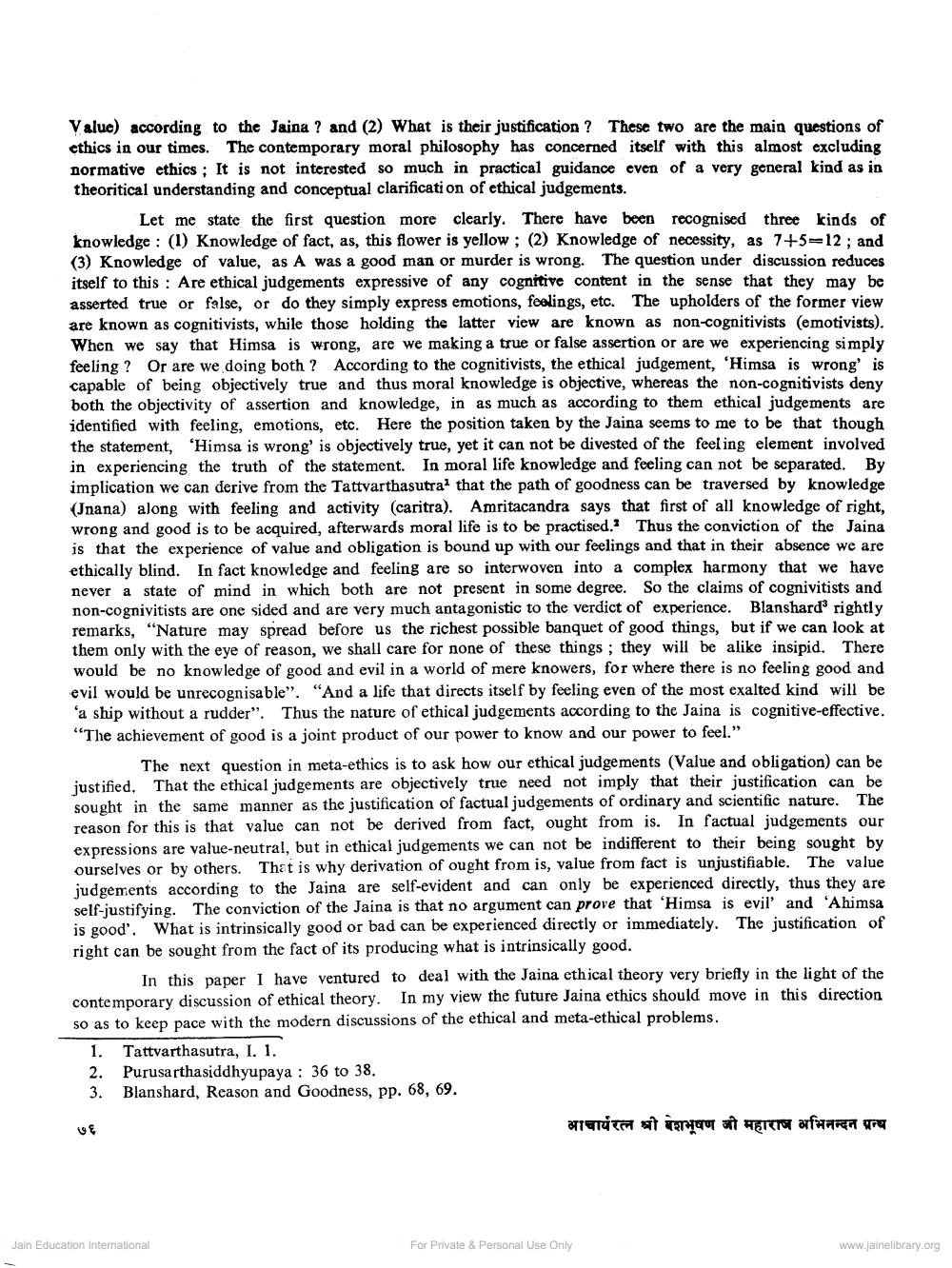Book Title: Jaina Ethical Theory Author(s): Kamalchand Sogani Publisher: Z_Deshbhushanji_Maharaj_Abhinandan_Granth_012045.pdf View full book textPage 4
________________ Value) according to the Jaina ? and (2) What is their justification? These two are the main questions of ethics in our times. The contemporary moral philosophy has concerned itself with this almost excluding normative ethics ; It is not interested so much in practical guidance even of a very general kind as in theoritical understanding and conceptual clarification of ethical judgements. Let me state the first question more clearly. There have been recognised three kinds of knowledge : (1) Knowledge of fact, as, this flower is yellow; (2) Knowledge of necessity, as 7+5=12; and (3) Knowledge of value, as A was a good man or murder is wrong. The question under discussion reduces itself to this : Are ethical judgements expressive of any cognitive content in the sense that they may be asserted true or false, or do they simply express emotions, feelings, etc. The upholders of the former view are known as cognitivists, while those holding the latter view are known as non-cognitivists (emotivists). When we say that Himsa is wrong. are we making a true or false assertion or are we experiencing simply feeling? Or are we doing both ? According to the cognitivists, the ethical judgement, 'Himsa is wrong' is capable of being objectively true and thus moral knowledge is objective, whereas the non-cognitivists deny both the objectivity of assertion and knowledge, in as much as according to them ethical judgements are identified with feeling, emotions, etc. Here the position taken by the Jaina seems to me to be that though the statement, 'Himsa is wrong' is objectively true, yet it can not be divested of the feeling element involved in experiencing the truth of the statement. In moral life knowledge and feeling can not be separated. By implication we can derive from the Tattvarthasutrathat the path of goodness can be traversed by knowledge (Jnana) along with feeling and activity (caritra). Amritacandra says that first of all knowledge of right, wrong and good is to be acquired, afterwards moral life is to be practised. Thus the conviction of the Jaina is that the experience of value and obligation is bound up with our feelings and that in their absence we are ethically blind. In fact knowledge and feeling are so interwoven into a complex harmony that we have never a state of mind in which both are not present in some degree. So the claims of cognivitists and non-cognivitists are one sided and are very much antagonistic to the verdict of experience. Blanshard rightly remarks, "Nature may spread before us the richest possible banquet of good things, but if we can look at them only with the eye of reason, we shall care for none of these things, they will be alike insipid. There would be no knowledge of good and evil in a world of mere knowers, for where there is no feeling good and evil would be unrecognisable". "And a life that directs itself by feeling even of the most exalted kind will be 'a ship without a rudder". Thus the nature of ethical judgements according to the Jaina is cognitive-effective. “The achievement of good is a joint product of our power to know and our power to feel." The next question in meta-ethics is to ask how our ethical judgements (Value and obligation) can be justified. That the ethical judgements are objectively true need not imply that their justification can be sought in the same manner as the justification of factual judgements of ordinary and scientific nature. The reason for this is that value can not be derived from fact, ought from is. In factual judgements our expressions are value-neutral, but in ethical judgements we can not be indifferent to their being sought by ourselves or by others. That is why derivation of ought from is, value from fact is unjustifiable. The value judgements according to the Jaina are self-evident and can only be experienced directly, thus they are self-justifying. The conviction of the Jaina is that no argument can prove that 'Himsa is evil' and 'Ahimsa is good'. What is intrinsically good or bad can be experienced directly or immediately. The justification of right can be sought from the fact of its producing what is intrinsically good. In this paper I have ventured to deal with the Jaina ethical theory very briefly in the light of the contemporary discussion of ethical theory. In my view the future Jaina ethics should move in this direction so as to keep pace with the modern discussions of the ethical and meta-ethical problems. 1. Tattvarthasutra, I. 1. 2. Purusarthasiddhyupaya : 36 to 38. 3. Blanshard, Reason and Goodness, pp. 68, 69. आचार्यरत्न श्री वेशभूषण जी महाराज अभिनन्दन ग्रन्थ Jain Education International For Private & Personal Use Only www.jainelibrary.orgPage Navigation
1 2 3 4 5 6 7 8 9 10 11 12
